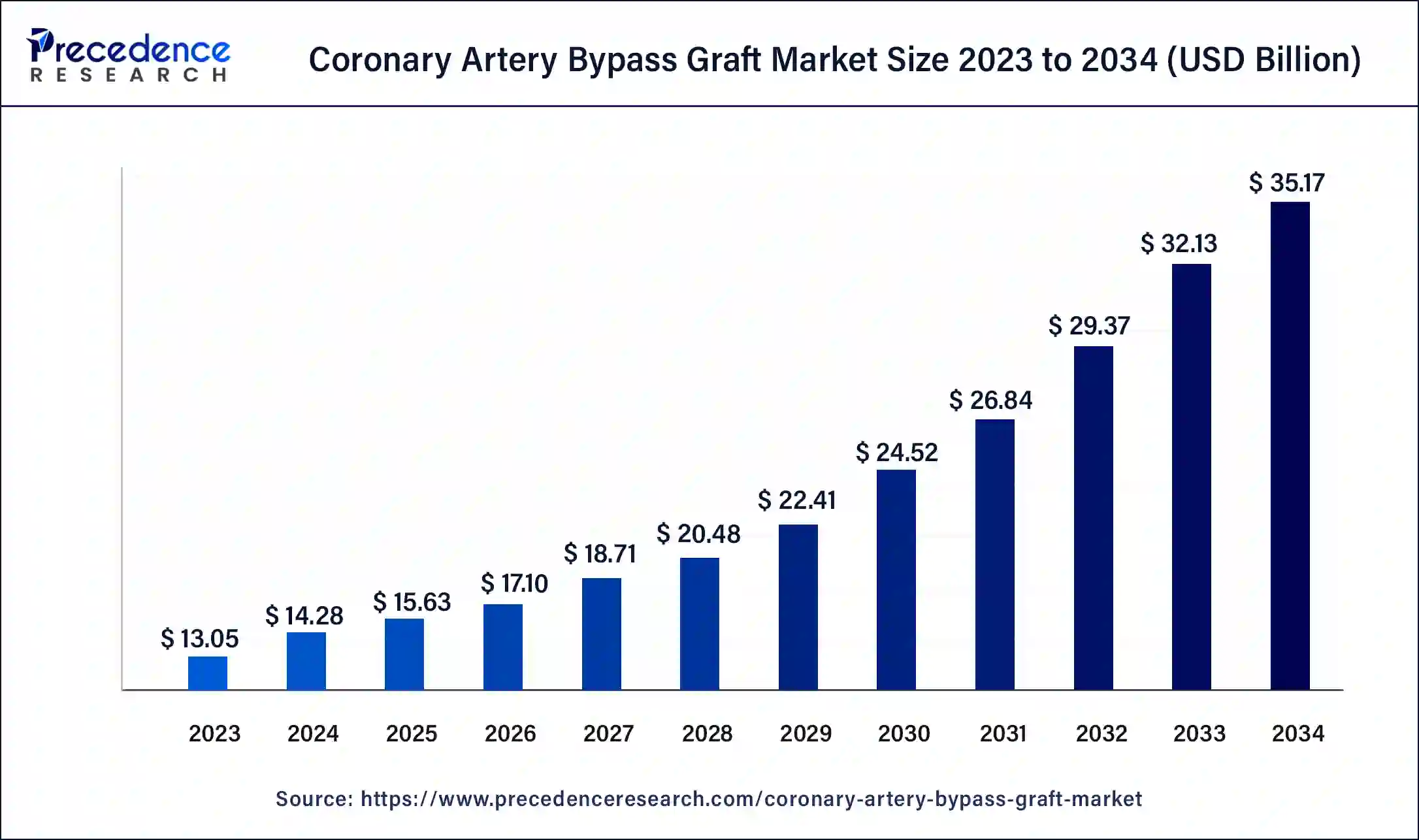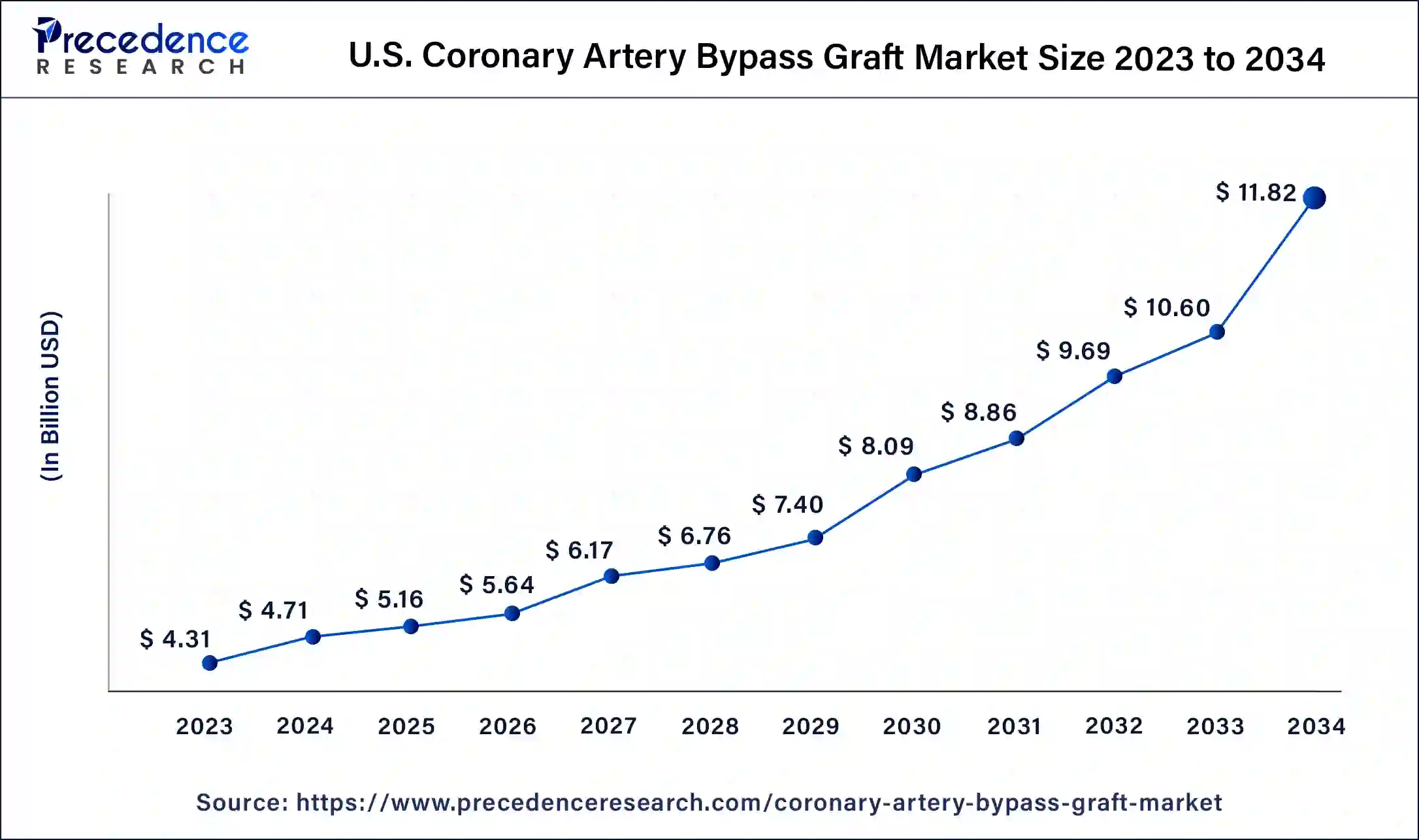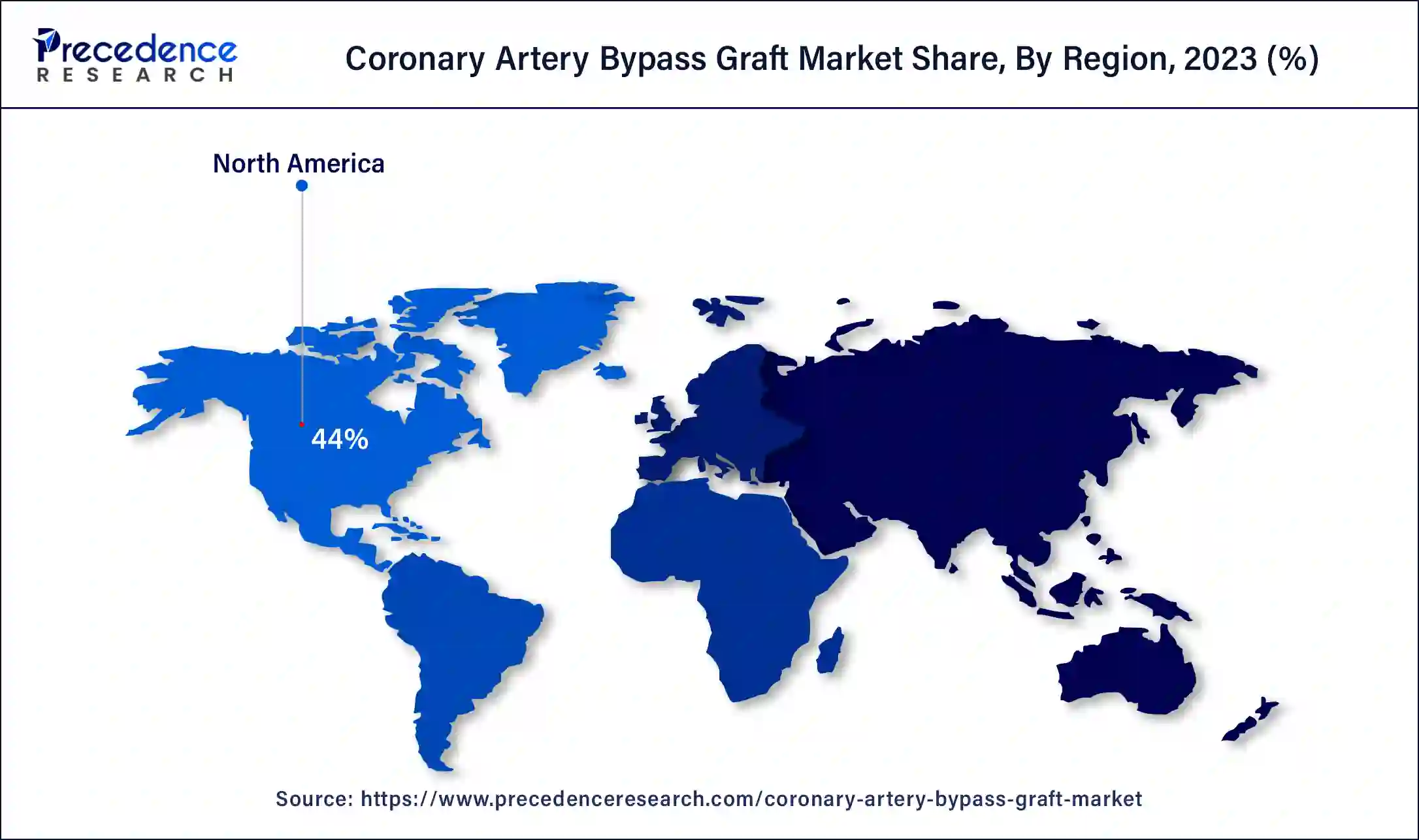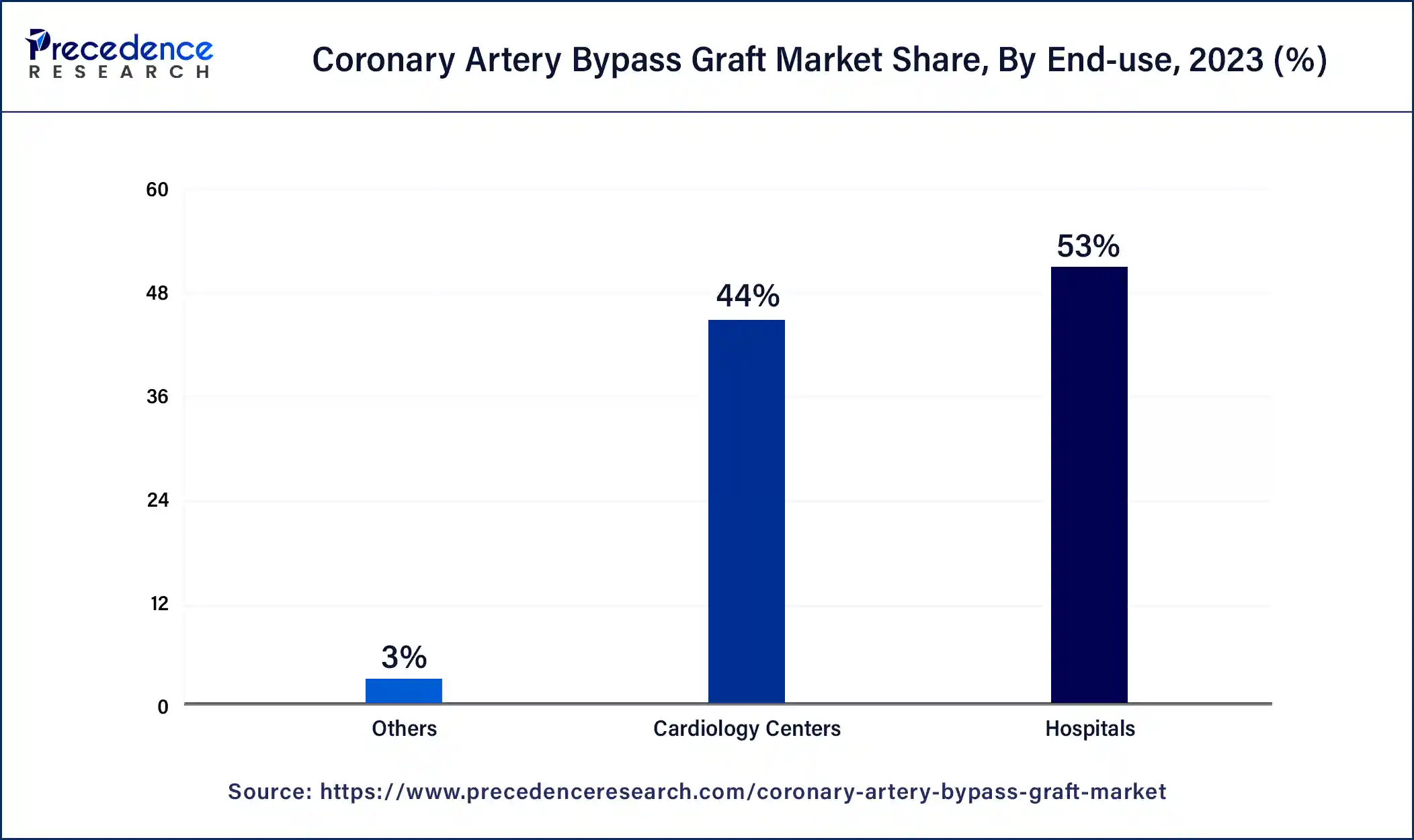Coronary Artery Bypass Graft Market Size and Forecast 2025 to 2034
The global coronary artery bypass graft market size is calculated at USD 7.52 billion in 2025 and is predicted to increase from USD 9.69 billion in 2026 to approximately USD 73.50 billion by 2034, expanding at a CAGR of 9.43% from 2025 to 2034. The need for the coronary artery bypass graft market is driven by the rise in cardiovascular illnesses worldwide, which frequently necessitate surgical intervention

Coronary Artery Bypass Graft Market Key Takeaways
- In terms of revenue, the global coronary artery bypass graft market was valued at USD 14.28 billion in 2024.
- It is projected to reach USD 35.17billion by 2034.
- The market is expected to grow at a CAGR of 9.43% from 2025 to 2034.
- North America dominated the coronary artery bypass graft market with the largest market share of 44% in 2024.
- Asia Pacific is set to host the fastest-growing market over the forecast period.
- By method, the off-pump segment contributed the biggest market share of 54% in 2024.
- By method, the on-pump segment is expected to grow at the fastest rate in the market over the study period.
- By surgical procedure, the single CABG surgery segment has held a major market share of 34% 2024.
- By surgical procedure, the double CABG surgery segment is expected to grow at the fastest rate in the market over the study period.
- By end use, the hospital segment contributed the biggest market share of 53% in 2024.
- By end use, the cardiology centers segment is expected to grow at the fastest rate in the market over the study period.
U.S. Coronary Artery Bypass Graft Market Size and Growth 2025 to 2034
The U.S. coronary artery bypass graft market size is exhibited at USD2.03 billion in 2025 and is projected to be worth around USD 20.25 billion by 2034, poised to grow at a CAGR of 9.64% from 2025 to 2034.

North America held the largest share of the coronary artery bypass graft market in 2024. The need for CABG treatments is fueled by the increased incidence of cardiovascular illnesses, which are caused by conditions including obesity, diabetes, and high blood pressure. The prevalence of coronary artery disease is rising in North America due to the aging population, which in turn is driving up demand for CABG treatments. Government and private insurers' coverage and reimbursement practices have a big influence on the market.
Access to CABG treatments is facilitated in part by government support for heart disease treatment and comprehensive insurance plans. The effectiveness of CABG treatments is being improved by advancements in imaging technologies, surgical equipment, and new graft materials, including biological and synthetic choices. The market is growing in part because of rising public knowledge and education on cardiac disease and the advantages of CABG treatment.

Asia Pacific is set to host the fastest-growing coronary artery bypass graft market over the forecast period. One important factor is the increasing incidence of cardiovascular illnesses, such as coronary artery disease. This trend is influenced by variables like aging populations, changing lifestyles, and rising rates of hypertension and diabetes. The efficiency and security of CABG surgeries are being enhanced by advances in surgical methods and technology, including less intrusive approaches and better graft materials.
Enhancements in the healthcare infrastructure and rising healthcare expenditures in numerous Asia Pacific nations are making advanced therapies, such as CABG procedures, more accessible. The need for CABG is rising as a result of improved cardiovascular health awareness and the development of diagnostic techniques that enable early identification and treatment of coronary artery disorders.
Market Overview
Products and services linked to surgical treatments intended to treat coronary artery disease (CAD) by enhancing heart blood flow are included in coronary artery bypass graft (CABG). The increasing global prevalence of coronary artery disease makes the coronary artery bypass graft market substantial. It is anticipated to increase gradually as the need for CABG procedures is driven by an aging population and a rising prevalence of risk factors.
Market growth is attributed to factors such as an aging population, an increase in the prevalence of coronary artery disease, technological breakthroughs in surgical methods, and enhanced healthcare infrastructure. The market's growth may be impacted by the high cost of surgery, the possibility of complications, and competition from non-surgical treatments like percutaneous coronary interventions (PCI).
In order to improve results and shorten recovery times, research is always being conducted on graft materials, surgical procedures, and the integration of new technology, such as robotic surgery. The CABG methods are changing due to the integration of robotics and minimally invasive techniques, which may lead to shorter recovery times and better patient results. Improving pre-and post-operative care, as well as personalized medicine, are increasingly crucial for raising the success rates of CABG procedures.
The market for CABG is anticipated to expand steadily overall due to rising rates of cardiovascular disease and improvements in surgical methods. A developing market where healthcare spending is rising and the incidence of coronary heart disease is rising. India and China are two nations where the number of CABG procedures is rapidly increasing.
How AI is Implemented for Cardiac Surgeries?
The role of artificial intelligence is observed to sustain over the period in overall healthcare sector. Among which the application of AI in cardiac surgeries is seen to leverage. AI has stepped as a major tool to potentially boost the efficacy of cardiac surgery necessities as it has the capability to judge or detect risk assessment, prognostication and stratification. Machine learning also leverages efficiency of post-operative complications. Multiple studies have revealed that AI implementation has immensely helped healthcare providers in decision making processes such as provision of healthcare support post surgeries, real-life clinical setting and image interpretation of clinical risk assessment.
Coronary Artery Bypass Graft Market Growth Factors
- One important factor is the rise in the prevalence of cardiovascular illnesses, such as coronary artery disease. Lifestyle variables that contribute to the higher prevalence include smoking, eating poorly, and not exercising.
- Because older persons are more likely to develop coronary artery disease, an aging global population makes them more vulnerable to cardiovascular problems and increases the demand for the coronary artery bypass graft market.
- Surgical technique innovations that improve operation efficiency and results, such as robotic-assisted surgery and minimally invasive CABG, are being adopted more frequently.
- The need for CABG procedures is influenced by the ability to detect and treat coronary artery disease early due to increased knowledge and diagnostic capabilities.
- The development of the CABG market is aided by the expansion and enhancement of the healthcare infrastructure, which includes cutting-edge cardiac care facilities and improved access to healthcare services.
- Diabetes and high blood pressure are two major risk factors for coronary artery disease, which raises the need for CABG treatments.
- The CABG industry is expanding as a result of governments and organizations placing a greater emphasis on cardiovascular health through research and public health efforts.
- The creation of novel graft biomaterials and enhanced stent technology has the potential to improve CABG treatment outcomes and propel market expansion.
- The market is expanding as a result of improvements in the surgical instruments and equipment used during CABG procedures, which improve results and boost efficiency.
- Growth in the coronary artery bypass graft market is aided by more accessible CABG operations for patients and healthcare providers due to more favorable reimbursement rules in different areas.
Market Scope
| Report Coverage | Details |
| Market Size by 2034 | USD 73.50 Billion |
| Market Size in 2025 | USD 7.52 Billion |
| Market Size in 2026 | USD 9.69 Billion |
| Market Growth Rate from 2025 to 2034 | CAGR of 9.43% |
| Largest Market | North America |
| Base Year | 2025 |
| Forecast Period | 2025 to 2034 |
| Segments Covered | Method, Surgical Procedure, End use, and Regions |
| Regions Covered | North America, Europe, Asia-Pacific, Latin America and Middle East & Africa |
Market Dynamics
Driver
Improved healthcare infrastructure
Early identification of coronary artery disease is now possible thanks to advancements in diagnostic tools and imaging technologies, such as high-resolution MRI and CT scanners. This results in more people being evaluated for CABG procedures and prompt intervention. Better post-operative care for CABG patients is ensured by upgraded ICU and recovery room facilities, which shortens recovery times and improves overall results.
This covers specialist cardiac care units and cutting-edge monitoring devices. Upgrades to the physical therapy and lifestyle modification programs offered at cardiac rehabilitation facilities give patients individualized rehabilitation plans that are essential for the coronary artery bypass graft market. Better patient care results from improved healthcare infrastructure, which enables continuing education and training for medical staff and keeps them up to date on the newest CABG methods and innovations.
Restraint
Patient compliance and lifestyle factors
Individuals who take their prescription drugs as directed (statins, antiplatelet medications, etc.) are at lower risk of side effects or graft failure. Improved long-term results from high compliance rates may lessen the need for follow-up procedures and impact consumer demand. Smoking can have an impact on graft health and is a significant risk factor for cardiovascular disease. Following CABG, patients who give up smoking or refrain from smoking are more likely to experience better results, which may have an impact on general market trends. The coronary artery bypass graft market can be influenced by lower total healthcare expenditures resulting from improved patient outcomes achieved via compliance and healthy lifestyles.
Opportunity
Focus on personalized medicine
Genetic and biomarker analysis are used in personalized medicine to identify patient-specific hazards and forecast treatment outcomes. This can aid in anticipating possible issues and choosing the best graft material and surgical methods. In the coronary artery bypass graft market, better risk stratification is made possible by personalized medicine, which can identify individuals who may be more susceptible to problems or transplant failure. Individualized treatment plans can lead to improved surgical outcomes, such as lower graft failure rates, fewer complications, and quicker recovery periods. Personalized medicine can result in cost savings over time by lowering problems and hospital readmissions, even if it may initially cost more due to enhanced diagnostic testing and customized therapies.
Method Insights
The off-pump segment dominated the coronary artery bypass graft market in 2024. In the coronary artery bypass graft market, procedures carried out without the use of a heart-lung machine which customarily assumes control of the patient's heart during the procedure are referred to as off-pump procedures. The surgeon does surgery on the beating heart instead. Growth in the off-pump CABG sector is being driven by advances in surgical instruments and techniques that make off-pump treatments more practical as more surgeons and healthcare facilities adopt this technique. Growing patient preference for less intrusive procedures and better results also has an impact on this segment's growth. In contrast to typical on-pump CABG, patients frequently have a quicker recovery and less postoperative inflammation.
The on-pump segment is expected to grow at the fastest rate in the coronary artery bypass graft market over the study period. The term ‘on-pump' describes surgical procedures in which a heart-lung machine assumes the role of the patient's heart and lungs. By using this method, surgeons can do operations on a heart that is still and bloodless, which can enhance accuracy and results.
A steady surgical environment is made possible by on-pump CABG, which lowers the possibility of partial revascularization and enables more accurate graft placement. Though this can vary depending on patient characteristics and surgeon experience, some studies suggest that on-pump CABG can be associated with reduced rates of graft failure and better long-term outcomes compared to off-pump surgeries. Advancements are continuously improving the safety and effectiveness of on-pump CABG procedures in heart-lung devices and associated technology.
Surgical Procedure Insights
The single CABG surgery segment dominated the coronary artery bypass graft market in 2024. Within the coronary artery bypass graft market, the single CABG surgery sector describes the process of bypassing a single blocked coronary artery using a single artery or vein. This market category is a subset of the larger CABG market, which also covers a range of surgical methods and strategies for enhancing cardiac blood flow.
It involves employing a graft, usually obtained from the patient's own body (such as the internal mammary artery or the saphenous vein from the leg), to bypass a single obstructed artery. In certain clinical situations, a single CABG technique might be selected, which could have an effect on the market share of several CABG kinds. Patient decisions and market dynamics are impacted by potential problems and recovery timeframes.
The double CABG surgery segment is expected to grow at the fastest rate in the coronary artery bypass graft market over the study period. Due to the rise in cardiovascular illnesses and improvements in surgical procedures, the double CABG segment is expanding. This rise is attributed to both the aging population and the increasing incidence of coronary artery disease. It is common for people with two blocked coronary arteries to benefit from double CABG surgery.
When compared to alternative therapies, this operation can greatly enhance quality of life and heart function. The market includes a range of companies, from makers of medical devices to providers of healthcare services, that offer specific goods and technologies for double CABG procedures. Approvals and regulations from the government are very important in forming the market. Surgical operations are safe and effective when standards and rules are followed.
End-Use Insights
The hospital segment dominated the coronary artery bypass graft market in 2024. Hospitals are doing more CABG procedures as the prevalence of coronary artery disease increases. In areas where cardiovascular disease rates are high, this trend is especially noticeable. The effectiveness and safety of these surgeries are being improved by advances in surgical instruments and technology, as well as new surgical techniques such as minimally invasive CABG treatments.
As a result, hospitals are adopting these procedures more frequently. The growth of the CABG market is probably going to be driven by hospitals that have specialized cardiovascular departments and advanced cardiac care units. Modern infrastructure and equipment purchases help to sustain this trend. An increasing number of hospitals are implementing CABG operations due to better patient outcomes and faster recovery times made possible by new technologies and techniques.

The cardiology centers segment is expected to grow at the fastest rate in the coronary artery bypass graft market over the study period. The rising incidence of coronary artery disease and improvements in surgical methods and technology are driving the expansion of cardiology facilities in the CABG industry. The development of cardiology centers is facilitated by advancements in graft materials, imaging technologies, and surgical techniques such as less invasive CABG operations.
The capacity of cardiology centers to perform CABG procedures is improved by their growth and modernization, which includes the adoption of cutting-edge diagnostic and therapeutic technology. Region-to-region variations exist in the expansion and prevalence of cardiology centers; industrialized countries tend to have more sophisticated facilities than emerging economies. A combination of private practices, specialized cardiac facilities, and sizable hospital networks within this segment influences the market dynamics.
Coronary Artery Bypass Graft Market Companies
- Edwards Lifesciences Corporation
- Getinge AB
- Genesee Biomedical
- Guidant Corporation
- LivaNova plc.
- Medtronic plc.
- Novadaq Technologies Inc.
- Stryker Corporation
Recent Developments
- In February 2024, the international pharmaceutical business Hikma Pharmaceuticals PLC (Hikma) announced the U.S. launch of COMBOGESIC IV (acetaminophen and ibuprofen) injection. COMBOGESIC IV is an opioid-free intravenous pain reliever that combines 300 mg of nonsteroidal anti-inflammatory medication (NSAID) ibuprofen with 1,000 mg of acetaminophen.
- In February 2023, The Netherlands-based medical technology startup Xeltis secured €32 million in a Series D2 equity financing. Thanks in part to research at Eindhoven University of Technology, the company is leading the way in vascular therapy and heart valve replacement using a restorative approach.
Segment Covered in the Report
By Method
- Off-pump
- On-pump
- Minimally Invasive Direct
By Surgical Procedure
- Single CABG Surgery
- Double CABG Surgery
- Triple CABG Surgery
- Quadruple CABG Surgery
By End use
- Hospitals
- Cardiology Centers
- Others
By Geography
- North America
- Asia Pacific
- Europe
- Latin America
- Middle East & Africa
For inquiries regarding discounts, bulk purchases, or customization requests, please contact us at sales@precedenceresearch.com
Frequently Asked Questions
Ask For Sample
No cookie-cutter, only authentic analysis – take the 1st step to become a Precedence Research client
 Get a Sample
Get a Sample
 Table Of Content
Table Of Content
 sales@precedenceresearch.com
sales@precedenceresearch.com
 +1 804-441-9344
+1 804-441-9344
 Schedule a Meeting
Schedule a Meeting